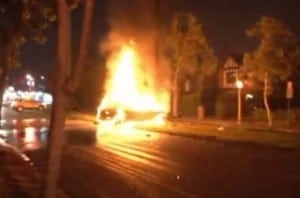OK – let me start by saying that The Security Ledger isn’t a web site that’s going peddle in rumor or unfounded conspiracy theories. Period. AND let me note that Richard Clarke, the former Cyber Security Czar and U.S. National Coordinator for Security, Infrastructure Protection and Counter-terrorism just told the Huffingtonpost.com that he thinks a car hack may have played a role in the suspicious, single car accident that killed investigative reporter Michael Hastings last week.
Whoa!

If you don’t know, Hastings was a Polk Award winning correspondent for the web site Buzzfeed.com, where he covered national security. He died, at age 33, in a fiery, single car crash in Los Angeles last week after the Mercedes he was driving hit a tree and burst into flames. The car was almost totally destroyed. The Los Angeles County Coroner confirmed Hastings identity but said it would likely take weeks to determine the cause of death.
Hastings death was greeted with shock by colleagues and immediately prompted questions about the circumstances surrounding the crash. Hastings work had earned him plenty of enemies in the U.S. government and in intelligence circles. Not least among them was General Stanley McChrystal, then head of US and NATO forces in Afghanistan. Hastings 201o profile of McChrystal in Rolling Stone Magazine, The Runaway General, was credited with forcing the General to resign his post. In the hours before his death, Hastings sent worried e-mail messages to colleagues about an FBI investigation of “friends and associates” that he felt was prompted by a “big story” he was working on. The FBI denied that there was any investigation into Hastings.
In an article posted on Monday, The Huffington Post quoted Clarke saying that, while he was “not a conspiracy guy,” his rule has always been “you don’t knock down a conspiracy theory until you can prove it . And in the case of Michael Hastings, what evidence is available publicly is consistent with a car cyber attack. And the problem with that is you can’t prove it.”
True – that’s not a ringing endorsement of the “Hastings was murdered by a car hack” conspiracy theory, but Clarke is a well-regarded authority on all matters related to cyber security and cyber warfare. His interview with Huffingtonpost doesn’t advance the car hacking theory, but it puts it on the map as a real possibility, with Clarke saying that offensive hacking of automobile systems is a reality, not just a theory for intelligence agencies. ”
“What has been revealed as a result of some research at universities is that it’s relatively easy to hack your way into the control system of a car, and to do such things as cause acceleration when the driver doesn’t want acceleration, to throw on the brakes when the driver doesn’t want the brakes on, to launch an air bag,” Clarke told The Huffington Post. “You can do some really highly destructive things now, through hacking a car, and it’s not that hard.”
Officials for the Los Angeles Police Department say that they are investigating the cause of the car crash but have ruled out foul play in the accident. An eyewitness to the accident described what appeared to be a straight forward case of reckless driving, saying Hastings’ car was driving “at maximum speed” and “way too fast” before it hit an irregular road surface and lost control, slamming into a palm tree and bursting into flames.
But Clarke said that a crash caused by a compromise of systems that controlled the automobile’s computer systems would be almost impossible to detect – especially with many of those systems consumed by the ensuing fire. “If there were a cyber attack on the car — and I’m not saying there was — I think whoever did it would probably get away with it,” he said.
